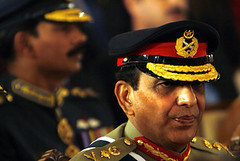“I think it’s important for us to get it right,” President Obama said on Tuesday of the American relationship with Pakistan. Lately, though, we haven’t.
After 2009, the United States and Pakistan constructed what they called a “strategic dialogue”—addressing Pakistan’s needs for economic growth, its search for energy and water security, Afghanistan, and possible negotiations with the Taliban—to define and solidify a long-term partnership. Three years later, those ambitions are in tatters, undone by the Raymond Davis affair, the killing of Osama Bin Laden, and continuing drone strikes, which most Pakistanis regard as acts of war.
In late February, I travelled to Pakistan and met with a number of military officers there, including several senior ones. They explained how they saw, from their side, the rise and collapse of the strategic dialogue with Washington.
It is a story laced with the generals’ resentments, geopolitical calculations, fears, and aspirations. Listening to them after absorbing the recent months of Pakistan ennui and Pakistan bashing in Washington was like watching one of those movies where a single narrative is told and retold selectively, from irreconcilable points of view.
Some of the basics of the Pakistan Army’s arguments about the Afghan war and the struggle against Al Qaeda-influenced terrorist groups are contained in a twelve-page document called “Ten Years Since 9/11: Our Collective Experience (Pakistan’s Experience).” The document, labelled “Secret,” is below; it has not previously been published.
Despite its classification, the essay is perhaps best understood as part of a Pakistani strategic communications or lobbying campaign. (Presumably, the sources that provided the document to me were undertaking an act in that campaign.) This particular text was a basis for briefings that General Ashfaq Kayani, the powerful Army chief, provided to NATO leaders at closed meetings last September, around the tenth anniversary of the 2001 attacks. It updates a case Pakistani generals have been making in meetings with their counterparts for years: that the casualties, economic disruption, and radicalization Pakistan has suffered from because of spillover from the American military campaign in Afghanistan are deeply underappreciated. The essay declares that Pakistan’s total casualties—dead and wounded—since 2001 in the “fight against terrorism” number about forty thousand. More
